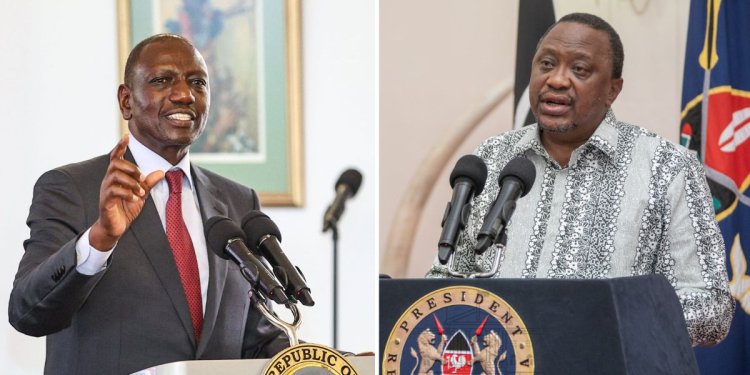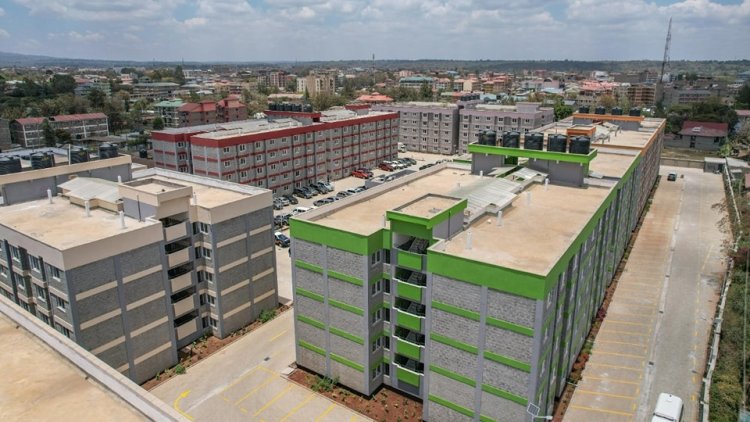Similarities Between Ruto, Uhuru Housing Fund & Hussein Mohamed's Stance
President William Ruto is attempting to adopt a similar strategy to his predecessor, but he plans to impose a 3 per cent levy on all salaried workers

Former President Uhuru Kenyatta on December 28, 2018, found himself in uncharted territory regarding his plan to deduct 1.5 per cent from Kenyans' salaries in favour of the National Housing Fund.
During the State of the Nation address held at Mombasa State House, Hussein Mohamed who was working at Citizen TV at the time compelled Uhuru to offer clarity regarding the controversial deductions, which drew mixed reactions from Kenyans.
Hussein had pressured the president to explain to Kenyans why they would be required to sacrifice 1.5 per cent of their salary towards the Housing Fund.
"Why would someone be forced to pay the tax yet they may not necessarily buy into the plan?" posed Hussein.

Principal Secretary, State Department for Housing and Urban Development, Charles Hinga, during the press briefing on the housing agenda at State House on May 24, 2023. /TWITTER.HUSSEIN MOHAMED
Uhuru responded swiftly by clearing the air on fears that the deductions were to serve as another form of tax on Kenyan employees by assuring them that the contributions were merely a saving and not a tax as per reports leading up to the address.
"You see, that is where you are getting it wrong because you are misleading people by telling them that it is a tax. It is not a tax, it is a saving and a contribution towards owning a home. It is not a tax, it is a contribution," he argued.
Uhuru also explained during the interview that Kenyans contributing to the fund would get back their money if they were not interested in settling in the constructed houses.
In his defence of the mandatory contributions, Uhuru argued that the country had an exorbitant mortgage system with rates that were out of reach to most Kenyans.
"Gentlemen, let us not go so far. We are living in a country where since independence, we have less than 500,000 mortgage householders. We have people who go to borrow and are given a loan to pay for five years. How do you pay that for five years?
"If the government and Kenyans don't get involved in that process, we continue with this system that becomes exorbitant, and that is why you don't have affordable houses in the country," he added.
Despite his defence of the government imposing a 1.5 per cent deduction on Kenyans' salaries, the court stopped the plan through a ruling by Lady Justice Maureen Onyango in April 2019.
"Since there were previous orders stopping the implementation of the housing fund levy, I am satisfied the application by Cofek is of utmost urgency and grant order stopping the deduction of employees' salaries until May 20 when the dispute will be heard,” Onyango noted.
The plan was abolished by the court which forced Uhuru to change his strategy in adopting the Affordable Housing Agenda. Five years later, Hussein Mohamed, who is the State House spokesperson, is in support of the plan.
President William Ruto is attempting to adopt a similar strategy to his predecessor, but he plans to impose a 3 per cent levy on all salaried workers, private and public, which is twice the rate that was there in Uhuru's regime.
Just like Uhuru, Ruto argued that the 3 per cent was not a tax but rather a saving, though it would act as a guarantee for investors building the houses.
He further noted that Kenyans would withdraw their money after seven years if they choose to opt out of the fund. In a similar fashion, the proposed deductions have drawn mixed reactions from Kenyans, however, Ruto's proposals have led to mostly uproar.


 admin
admin 




